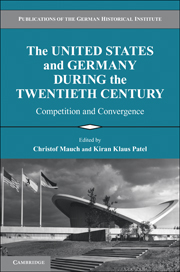Book contents
- Frontmatter
- Contents
- Contributors
- Acknowledgments
- 1 Modernities: Competition versus Convergence
- 2 Empires: Might and Myopia
- 3 Religion: Belief and Power
- 4 Law: Constitutionalism and Culture
- 5 Welfare: Entitlement and Exclusion
- 6 Immigration: Myth versus Struggles
- 7 Masses: Mobilization versus Manipulation
- 8 Market: Consumption and Commerce
- 9 Authority: Schools and Military
- 10 Gender: Equality and Differences
- 11 Environment: Conservation versus Exploitation
- 12 Film and Television
- 13 Education: Universities and Research
- 14 Media: Government versus Market
- Index
9 - Authority: Schools and Military
Published online by Cambridge University Press: 12 October 2018
- Frontmatter
- Contents
- Contributors
- Acknowledgments
- 1 Modernities: Competition versus Convergence
- 2 Empires: Might and Myopia
- 3 Religion: Belief and Power
- 4 Law: Constitutionalism and Culture
- 5 Welfare: Entitlement and Exclusion
- 6 Immigration: Myth versus Struggles
- 7 Masses: Mobilization versus Manipulation
- 8 Market: Consumption and Commerce
- 9 Authority: Schools and Military
- 10 Gender: Equality and Differences
- 11 Environment: Conservation versus Exploitation
- 12 Film and Television
- 13 Education: Universities and Research
- 14 Media: Government versus Market
- Index
Summary
In 1966, Stanley Herzon learned that his draft lottery number was 115, a possible ticket to Vietnam. He managed to fail his medical exam and remained convinced, decades later, that America's intervention in Southeast Asia had been a terrible mistake. Yet, curiously, this now-middle-aged businessman also felt wistful. He'd grown up “soft,” he told an interviewer, “longing for the discipline” of military service.
Stanley Herzon's sentiment provides an iconic statement of modernity. Before the late nineteenth century, few would have thought that the state had the right, much less the duty, to discipline the young. The demographic and technological revolutions that produced modern societies by the end of the eighteenth century enlarged the reach of public institutions. But only during the past one hundred years were governments sufficiently powerful to regulate mass behavior in a comprehensive manner, at least in theory, as they could for the first time reach urban and rural areas, social classes, and ethnic groups in a similar way. From the time the United States was founded, the key to achieving this goal was a state-shaped definition of citizenship. The state could define citizenship, which helped it regulate mass behavior. “Good” Americans praised the free market, lauded individualism, and embraced the theory of equality, even if they did not always enact it as an ideal. Not surprisingly, expectations for “good” Germans were hardly as consistent. Obedient imperial subjects mutated into tolerant Weimar nationalists and then became fervent followers of Hitler. A denazifiedWest Germany asked its citizens to support democracy; the German Democratic Republic wanted committed socialists.
Despite substantive differences, both Germany and the United States wanted public institutions to instill certain norms from childhood onward. During decades of sometimes bitter antagonism, the two rivals cooperated in usually unacknowledged ways to impose a new condition of modernity: state-controlled categorizations of entire populations. On both sides of the Atlantic, the economic, social, and emotional roles traditionally played by families shrank as state law displaced private choices and the rearing of properly trained citizens became a public obligation. Various public institutions tried to impart societal standards to the young. Juvenile courts implemented laws that defined deviant behavior, sending offenders to so-called reformatories. Schools and armies, however, were the most broadly important institutions, and for that reason they are the focus of this chapter.
- Type
- Chapter
- Information
- The United States and Germany during the Twentieth Centurycompetition and convergence, pp. 144 - 160Publisher: Cambridge University PressPrint publication year: 2010



